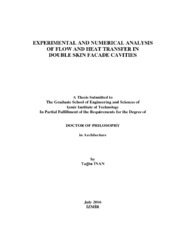Please use this identifier to cite or link to this item:
https://hdl.handle.net/11147/4859| Title: | Experimental and Numerical Analysis of Flow and Heat Transfer in Double Skin Facade Cavities | Other Titles: | Çift Cidarlı Cephe Kavitelerinde Akış ve Isı Transferinin Deneysel ve Sayısal Analizi | Authors: | İnan, Tuğba | Advisors: | Başaran, Tahsin | Keywords: | Heat transfer Double skin facade Airflow Energy performance |
Publisher: | İzmir Institute of Technology Izmir Institute of Technology |
Source: | İnan, T. (2016). Experimental and numerical analysis of flow and heat transfer in double skin facade cavities. Unpublished doctoral dissertation, İzmir Institute of Technology, İzmir, Turkey | Abstract: | In this study, airflow and heat transfer in a double skin facade (DSF) cavity were examined numerically and experimentally under natural and forced flow conditions. An experimental setup was constructed i the laboratory environment. Experiments were performed for two different DSF's airflow modes; buffer zone and external air channel. These experiments vere conducted with and without a solarsimulator integratrd t the system. Furthermore, the effect of pressure drop elements in the cavity of DSF were analyzed experimentally. After the numerical results (CFD and nodal network) were verified with experimental measurements, dimensionless heat transfer correlations were developed for the natural and forced convections. As a result, an extensive experimental data set was obtained for different working conditions of DSF. So, the dimensionless pressure loss coefficients were calculated experimentally based on the geometric configuration of the pressure drop elements in the cavity. In natural convection, with Rayleigh numbers ranging from 8.59*109 to 1.41*1010 and the increasing tendency of the average Nusselt numbers from 142.6 to 168.8 were shown. A correlation for a cavity characteristic length of 0.116 was constructed to evaluate the heat flux. In forced convection, another dimensionless correlations weredeveloped to predict the heat transfer by using. Nusselt numbers with in the Reynolds numbers ranging from 28000 to 56000 for a DSF with an external airflow mode. These correlations could be used for different characteristic length ranged betwen 0.1 and 0.16. These correlations were used for the energy performence of DSF applications for different directions and climatic zones in Turkey and compared with the single skin facede. | Description: | Thesis (Doctoral)--İzmir Institute of Technology, Architecture, İzmir, 2016 Full text release delayed at author's request until 2019.08.24 Includes bibliographical references (leaves: 246-258) Text in English; Abstract: Turkish and English xx, 262 leaves |
URI: | http://hdl.handle.net/11147/4859 |
| Appears in Collections: | Phd Degree / Doktora Sürdürülebilir Yeşil Kampüs Koleksiyonu / Sustainable Green Campus Collection |
Files in This Item:
| File | Description | Size | Format | |
|---|---|---|---|---|
| T001516.pdf | DoctoralThesis | 9.17 MB | Adobe PDF |  View/Open |
CORE Recommender
Page view(s)
334
checked on Apr 28, 2025
Download(s)
312
checked on Apr 28, 2025
Google ScholarTM
Check
Items in GCRIS Repository are protected by copyright, with all rights reserved, unless otherwise indicated.